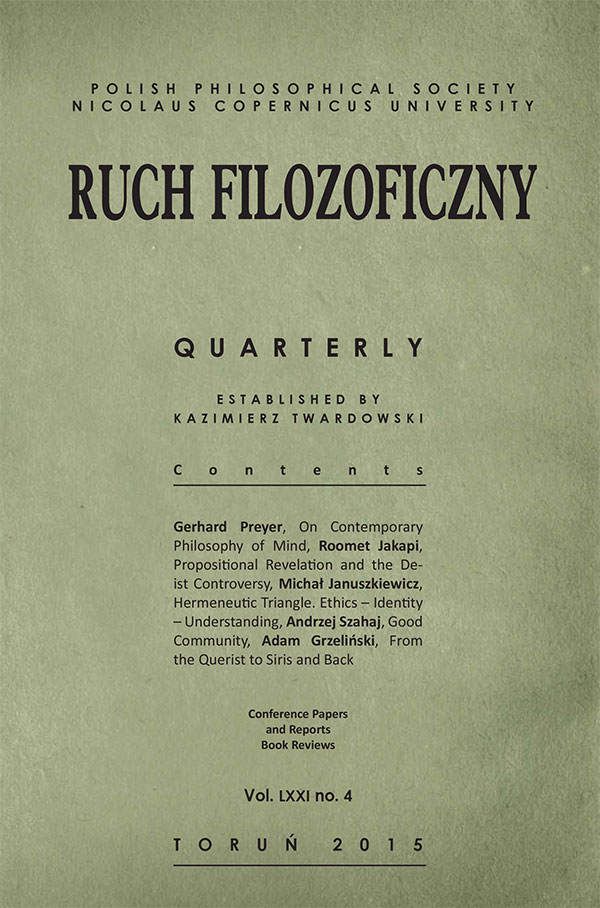Propositional Revelation and the Deist Controversy: A Note
DOI:
https://doi.org/10.12775/RF.2015.007Słowa kluczowe
Deism, revelation, meaning, John Locke, John Toland, Peter Browne, George BerkeleyAbstrakt
In this short paper, I address the question of how propositional revelation was understood by thinkers involved in the Deist controversy in Early Modern Britain and Ireland. I argue that, characteristically for the time, they relied on ideational theory of meaning and, accordingly, explained the content of propositional revelation in terms of subjective mental entities.
Bibliografia
Browne, P. A letter in answer to a book entitled Christianity not mysterious. Dublin: John North, 1697.
Browne, P. The procedure, limits, and extent of human understanding. 2nd ed. London: William Innys, 1729.
Browne, P. Things divine and supernatural conceived by analogy with things natural and human. London: William Innys and Richard Manby, 1733.
Byrne, P. ”The Deists”. In The History of Western Philosophy of Religion, edited by Graham Oppy and Nick Trakakis, Vol. 3, Early Modern Philosophy of Religion, pp. 211-222. Acumen, 2009.
Daniel, S. H. John Toland: His methods, manners, and mind. Montreal: McGill-Queen’s University Press, 1984.
Dawson, H. Locke, Language and Early-Modern Philosophy. Cambridge: Cambridge University Press, 2007.
Gerrish, B. A. ”Natural and revealed religion”. In The Cambridge History of Eighteenth-Century Philosophy, edited by Knud Haakonssen, Vol. 2, pp. 641–65. Cambridge: Cambridge University Press, 2006.
Jaffro, L., G. Brykman and C. Schwartz (eds.). Berkeley’s Alciphron: English text and essays in interpretation. Hildesheim: Georg Olms Verlag, 2010.
Jakapi, R. ”Faith, truth, revelation and meaning in Berkeley’s defense of the Christian religion (in Alciphron)”. The Modern Schoolman, 80 (2002), pp. 23-34.
Locke, J. An Essay Concerning Human Understanding. Edited by P. H. Nidditch, Oxford: Clarendon Press, 1975 [1690] .
Losonsky, M. ”Language, meaning, and mind in Locke’s Essay”. In The Cambridge Companion to Locke’s ”Essay Concerning Human Understanding”, edited by Lex Newman, pp. 286-312. Cambridge: Cambridge University Press, 2007.
Stephen, L. History of English Thought in the Eighteenth Century, Vol. 1. London: Smith, Elder, & Co, 1876.
Stewart, M. A., ”Revealed religion: the British debate”. In The Cambridge History of Eighteenth-Century Philosophy, edited by Knud Haakonssen, Vol. 2, pp. 683–709. Cambridge: Cambridge University Press, 2006.
Sullivan, R. E. John Toland and the Deist controversy: A study in adaptations. Cambridge, Massachusetts and London: Harvard University Press, 1982.
Swinburne, R. Revelation: From metaphor to analogy. 2nd ed. Oxford: Oxford University Press, 2007.
Toland, J. Christianity not mysterious: Or, a treatise shewing, that there is nothing in the gospel contrary to reason, nor above it: and that no Christian doctrine can be properly call’d a mystery. 2nd ed. London: Sam. Buckley, 1696.
Williford, K. and R. Jakapi, ”Berkeley’s theory of meaning in Alciphron VII”. British Journal for the History of Philosophy 17, 1 (2009), pp. 99-118.
Pobrania
Opublikowane
Jak cytować
Numer
Dział
Statystyki
Liczba wyświetleń i pobrań: 691
Liczba cytowań: 0



